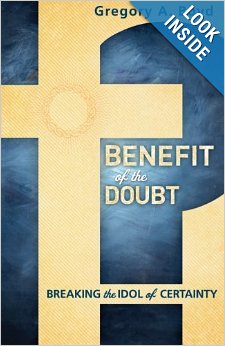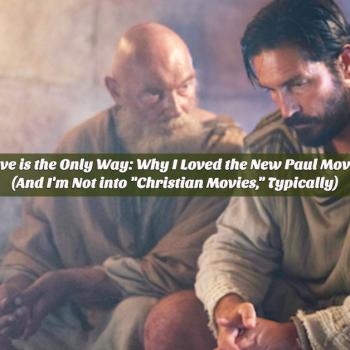Editor’s Note: This post is part of our “Life-changing Books” series; I chose not to use that in the title of this particular reflection. Also, I hope I can remind you of our great NT Wright Logos book giveaway (we are giving away a collection of 36 books!). Enter here!
——————————————————–
As a young college student I remember when I figured out that with just a few crafty arguments, one could demonstrate the divinity of Jesus by proving the resurrection of Jesus as a historical fact. The Case for Christ and various other influences, at the time, had me convinced that only a fool says in his/her heart ‘there is no God.’ Apologetics (the study and defense of the Christian faith) created a foundation for my relationship with God – an unbreakable one.
Over time, as I evolved along my own spiritual journey, apologetics gradually seemed less relevant (at least in the conservative/classical sense). I became and remain convinced that the greatest apologetic isn’t found in logic/reason/argumentation, but rather in narrative. The intersection between God’s story and our human story yields what many would call a relational apologetic. This approach, subjective as it is, seems to offer the most compelling evidence of God: a God who is manifest through our image-bearing. With that said, I do believe that apologetics has its place, for without logic our experiences easily dissolve into mere fantasy. Logic, when it is not the “foundation,” comes alongside relationality to offer resources for us who experience the elusive presence of the Divine.
The logic of classical evangelical/fundamentalist apologetics wanted the Bible to be the “foundation,” especially its verbal and plenary (inerrant) inspiration [if you don’t know those words, they’re not worth learning ;-)]. Those of us who find ourselves in post-conservative/emerging/semi-progressive/Anabaptist circles prefer to make that foundation the person of Jesus Christ. The way in which the Bible is (or isn’t) inspired by the Holy Spirit, then, is a secondary concern. This may seem like a bit of a leap (as the Bible is the primary source for understanding who Jesus is), but let’s be honest – that is exactly what faith is – a leap.
When our foundation is no longer a book, but rather a person, it’s natural for doubt to seep into the crevasses of our lives. We can dissect a book and give ourselves the feeling of complete assurance; we can’t do this with a person – let alone a person that we can’t see. Faith inevitably brings doubt.
Greg Boyd, in what I believe to be one of his most important books, invites followers of Jesus to embrace doubt. Benefit of the Doubt: Breaking the Idol of Certainty is, in fact, a critique of faith systems that foster the need for certainty. He believes that such approaches (which he calls “certainty-seeking faith”) unknowingly (innocently) creates an idol out of apologetics and the inspiration of Scripture. We don’t worship the Bible and the mode in which the Holy Spirit inspired the writers, rather we worship a person: Jesus of Nazareth. We don’t need to have all of the questions answered that a 2000+ year old collection of books leaves us with, but only need to be “confident enough.” Many of the issues that trip people up on the faith/doubt journey such as the historicity of the Flood or the age of the earth ought not to deter us from taking the leap to follow Jesus. Greg states:
…the thing that God most wants Scripture to do—point to the cross—leads me to expect it to reflect some limitations, imperfections and faults rather than to feel the need to defend it against these things…. So long as we can trust that God uses these narratives [biblical stories] to point us to Christ and to help us cultivate a relationship with Christ, it seems to me that how we resolve these [apologetics] issues, or even if we were to remain undecided about these issues, is completely inconsequential (185).
Although I will not have enough space to explicate each wonderful theme in Greg’s book, I hope to give you a glimpse into one of the central arguments. To move this post in that direction, here is one of many quotes that stood out to me as I read:
One of the most unfortunate consequences of certainty-seeking faith is that, because it rewards people for feeling certain they’re right and discourages people from questioning their perspectives, it conditions people to insist that their maps are the territory. People who embrace this kind of faith will be more inclined to assume that their interpretation of a biblical verse is the meaning of the verse itself. So to disagree with their interpretation is to disagree with the verse itself. In fact, the mind-set that this model of faith produces inclines people to forget they’re interpreting at all. As an angry man told me in a theological dispute some years ago, “I don’t interpret the Bible. I just read it!” (149).
This view of the Bible relates closely with people who have a “house of cards” sort of “certainty-seeking faith.” In a house of cards, if one card falls out of place, the whole structure falls down. This is how many certainty-seekers have set up their spiritual lives. These beliefs create a structure and if one belief is threatened then the whole reality of Christ is threatened. Rather, Greg believes that our foundation or center ought to be the historical person of Jesus Christ (who abides with us through the Holy Spirit).
For those who want more than a mere subjective faith, he suggests that the historical person of Jesus might just help us to be “confident enough” to follow Jesus. We don’t need the Bible to be the center/foundation, but can reframe the Bible’s place within our faith-doubt schema. He states:
The all-important center of the Christian faith is not anything we believe; it’s the person of Jesus Christ, with whom we are invited to have a life-giving relationship… I began to realize that I didn’t need to rely on the Bible as the inspired Word of God in order to enter into this relationship with Christ. Rather than believing in Jesus because I believe the Bible to be the inspired Word of God, as evangelicals typically do, I came to believe the Bible was the inspired Word of God because I first believe in Jesus. This is how I now encourage people to structure their faith, for I have found it to be a much surer intellectual foundation for my faith than the conviction that Scripture is the Word of God (158).
The question then becomes: How do we come to believe that Jesus is historically who the Bible basically claims him to be without our first assumption being that the Bible is inspired? Greg points to four areas for his own conviction, which he claims to hold apart from the divine inspiration of Scripture.
First, he notes that there are philosophical reasons to trust Christ is the incarnation of a God love versus competing narratives.
Second, he admits that some of his reasoning is existential. The God portrayed in the Bible “‘rings true’ with the deepest part of my being… [as] the greatest myth ever told” (160).
Third, some of Greg’s reasons are spiritual. The ways in which Christ has engaged in Greg’s life on a personal level are undeniable for his own life story and make it difficult to deny that Christ is real.
With that said, Greg attributes what he calls “the most compelling and most objective reasons (ibid)” for following Jesus to historical arguments. It is in the combination of these four categories, but especially the fourth, that Greg finds enough confidence to believe Jesus is who the disciples claimed he was/is. Historically, Greg offers a brief (yet compelling) vision of why it isn’t intellectually dishonest to see the testimony of the early church as basically reliable (space doesn’t permit me to expound it here, but read through 160-166 for the details). He adds:
…we don’t need to insist that their presentation is historically accurate on every point or that it is entirely devoid of legendary accretion. We need only accept that their testimony is generally reliable. If, generally speaking, Jesus lived the way they said he lived, made the claims and performed the miracles they said he performed, and died on a cross and then appeared to them, as they claimed, we can understand why they would have said these things about him, why they would have put their lives at risk by proclaiming their message about him, and why they would have allowed their Jewish faith to be overturned by treating this man as God (161).
What Greg has essentially done is taken a relational apologetic and given it intellectually honest reinforcement. This approach doesn’t deny the need for careful study but also doesn’t fall into the fallacy of certainty-seeking faith which assumes that the Bible is a perfect book (as its foundational presupposition). Therefore, when we wrestle with the many intellectual difficulties of the Scriptures (not to mention the experienced world that often seems void of God’s love), we can be “confident enough” that the Jesus we experience is the same Jesus that the early church proclaimed to be God. This is not to run away from doubt, but to have the courage to take steps forward with Christ with doubt as the very means through which faith is fostered. In this way, faith and doubt can be graceful dance partners.
I highly recommend Benefit of the Doubt. It conveys what it means to follow Jesus, in the midst of doubt, more effectively than any book I have ever read. More could be said about Greg’s insights that are not mentioned in this 1600 word reflection, but to get those, you are going need to be “confident enough” to pick up this book and read it!












